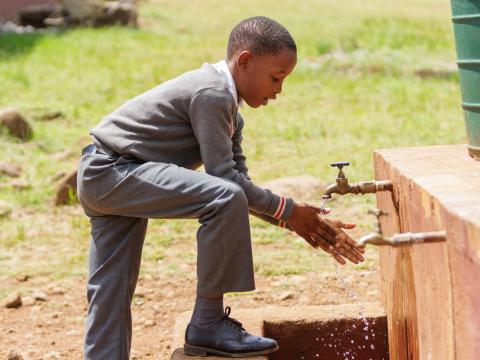Access to water and sanitation sees 50% increase in school's enrolment

With Khalakahle Methodist Primary School in Mpolonjeni, under the Lubombo Region in Eswatini, having no access to basic necessities such as access to clean water, learners and teachers were not so keen to be part of the school.
With Mpolonjeni Area Programme having achieved universal access to safe water under World Vision Eswatini's support, the school has seen a change in this area, with enrolment growing from just over 300 to over 450.
The school's Head Teacher, Tanele Magagula, attributes this growth in enrolment to the community’s confidence in the school’s ability to provide a conducive learning environment.
"Before World Vision supported our school with water, learners would often spend valuable learning hours fetching water from distant sources, leaving little time for school work," the Head Teacher states.
Through the organisation's Water, Sanitation and Hygiene (WASH) Technical Programme and community collaboration, clean water became a reality, creating a learner-friendly environment at the school in 2022. Khalakahle Methodist is one of the 17 primary and high schools who have access to water supply through the Mpolonjeni Water Project, benefiting about 10,000 learners in the Mpolonjeni area.
Without access to clean water, the school also had inadequate sanitation facilities and could not practice proper hygiene, making the use of the existing old sanitation facilities a dreaded task. World Vision also supported the school with construction of new VIP latrine toilets, with eight units for boys and another eight units for girls.
"The new toilets are much nicer and cleaner now and we no longer have to pinch our noses when using the toilet like before," says Kgomotso, a learner from the school.
Head Teacher Magagula shares the same sentiments about the state of the old sanitation facilities: "Our old toilets lacked privacy as they had no doors, had cracked floors, creating discomfort and embarrassment for our students when using them.”
She says the absence of handwashing facilities also added to the challenges faced by the learners daily. Today, this is also a story of the past since the installation of handwashing facilities by the humanitarian development organisation.
"The installation of eight handwashing facilities by the organisation in the school significantly improved hygiene, reducedillness transmission, and enhanced overall student wellbeing," Magagula elaborates.
She says having easy access to clean water and soap has helped develop healthy habits in the learners, further creating amore conducive learning environment. By addressing the most basic of needs, a brighter future has been paved for learners at Khalakahle, where every child has the opportunity to learn, thrive, and fulfill their potential.